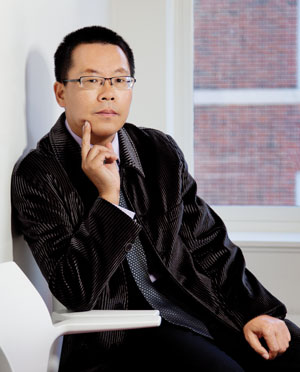Lawmakers ask ABA why it withdrew book offer to Chinese human rights lawyer

Teng Biao. ABA file photo by Len Irish.
Two Republican lawmakers are asking the ABA for “additional clarification” about its decision to withdraw a book offer made to a Chinese human rights lawyer.
U.S. Sen. Marco Rubio of Florida and U.S. Rep. Chris Smith of New Jersey want to know whether the book project was canceled because of fears or threats that ABA projects would be adversely affected in China. Smith and Rubio are chairs of the Congressional-Executive Commission on China.
Foreign Policy (reg. req.) obtained an email by an ABA employee that cited fears of “upsetting the Chinese government” in explaining why the book offer was being withdrawn. The book offer was made in December 2014 to Chinese legal activist Teng Biao and withdrawn the next month. Teng had left mainland China in October 2014.
“Apparently, there is concern that we run the risk of upsetting the Chinese government by publishing your book,” the email said, “and because we have ABA commissions working in China there is fear that we would put them and their work at risk.” Foreign Policy obtained the employee’s email from Teng.
Foreign Policy notes that the ABA’s Rule of Law Initiative, known as ROLI, has an office in Beijing.
ABA Associate Executive Director Robert Rupp, who oversees publishing services, counters that the employee was mistaken and the reasons for the withdrawn offer were “purely economic.”
Rupp gave this statement: “The 2014 decision not to proceed with publication of the book Darkness Before Dawn was made for purely economic reasons, based on market research and sales forecasting conducted by the association’s publishing group. Unfortunately, the reasons resulting in the decision were miscommunicated to Mr. Teng. We regret that Mr. Teng received erroneous information that did not reflect the views of the association or the process followed in evaluating his proposal. We sincerely apologize to Mr. Teng for this situation and are taking steps to ensure that it cannot occur again.”
Teng told the ABA Journal in a February 2015 feature that he had been detained and arrested multiple times, and kidnapped more than once. In 2011, Chinese authorities abducted Teng, tortured him and held him in solitary confinement for 70 days.
Smith and Rubio sought additional information in a letter to ABA President Paulette Brown and ABA executive director Jack Rives. The ABA is in the process of responding to their request.
Smith and Rubio write that the circumstances surrounding the withdrawn book offer “are deeply concerning and not worthy of the values and principles for which the ABA stands.” Smith and Rubio posed these four questions:
• Did the ABA receive any indication from the Chinese government or any other individuals that the programs it facilitates in China would be jeopardized if the book project were pursued?
• Do such calculations routinely enter in to ABA publishing decisions, either overtly, or indirectly?
• Was the ABA’s decision on the book influenced by concerns over the security and safety of ROLI staff in China or potential retaliation against the partnerships and work of its commissions and individual members?
• Did the ABA receive updated marketing information between the time that the book was commissioned and withdrawn?
Teng is a visiting fellow New York University School of Law’s U.S.-Asia Law Institute, according to this ABA Journal article.
Other publications noting Foreign Policy’s article include Bloomberg Big Law Business, Inside Higher Ed and the Wall Street Journal (sub. req.).



